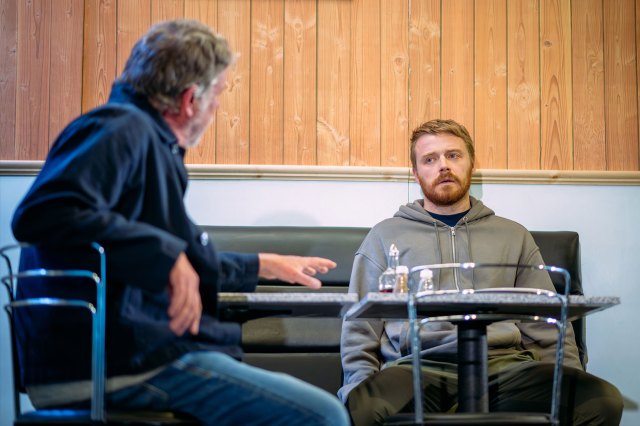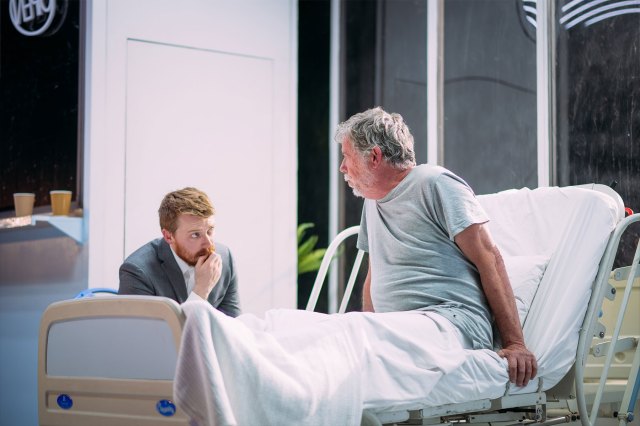The Fifth Step at the Lyceum Theatre – Edinburgh International Festival review
The National Theatre of Scotland’s world premiere production will also run at Glasgow’s Pavilion Theatre from 28 to 31 August

Playwright David Ireland, Belfast-born and Glasgow-based, likes to shock. He also likes making people laugh. It’s this combination that allows his plays to be so unsettling and incendiary.
Having tackled infanticide in Cyprus Avenue and Brexit and #MeToo in Ulster American, in The Fifth Step, his new play for the National Theatre of Scotland premiering at the Edinburgh International Festival, he turns his attention to Alcoholics Anonymous, or more specifically to the dysfunctional relationship between a young recovering alcoholic and his older sponsor. Chaos and violence inevitably ensue.
Jack Lowden, making his return to the stage for the first time since 2018, plays Luka, whom we first encounter in one of those bare rooms, with hard plastic chairs, where the lonely and the lost so often gather. Luka, all twitching eyes and legs, hands rammed fiercely into pockets, is both. He has stopped drinking, but he thinks he might be an incel; without alcohol, he has lost the ability to talk to women. He asks avuncular, kindly James (Sean Gilder) if he will be his sponsor, helping him through the minefield of abstinence.

The play unfolds from there, with Milla Clarke’s turning cube of a set and Lizzie Powell’s lighting opening up different rooms and vistas, from grungy cafes to the gym where Luka experiences a life-changing revelation. Although the narrative is built around the fifth step of the AA programme – the point where you share the moral inventory of everything bad you’ve done in your life with someone you trust – that’s not really Ireland’s interest.
What drives the work is a fascination with masculinity and how hard men find it to define themselves, or even to be truthful about their own feelings. In beautifully written and weighted dialogue, the two men constantly circle questions about sexuality and desire, their relationship with women, their longing to be – or to find – positive male role models. God, and the search for universal meaning, loom large; so do the failings of established religion.
It’s serious, but also incredibly funny. Luka’s gym revelation comes after he believes that the actor Willem Defoe, who once played Jesus, was exercising on the treadmill next to him; his description and James’s rising doubts are brilliantly conveyed. A discussion about pornography and masturbation has similarly accumulated comic power.

The acting from both men is superb, poised and unfussy. Lowden beautifully conveys Luka’s little-boy lost sensibility, the way he ricochets from one position to the next as he tries to find himself and make sense of the feelings that bombard him; Gilder allows James’s fallibilities to emerge more slowly, constantly trying to play the role of mentor without acknowledging his own flaws.
The drama, tightly directed by Finn den Hertog, isn’t entirely naturalistic. Early on, Luka explains his love for horror movies – the more violent, the better – and there’s always a hint of menace, of the supernatural and unexplained as the tension rises. Films too, and the way they shape how we see the world, and our expectations of how things will develop, also play a part in Ireland’s complex structure. The scene from Raging Bull that Luka enacts – with a great De Niro impersonation from Lowden – in the first scene, finds a real-life counterpart later.
It’s clever, taut writing, never losing its grip. The play doesn’t reach any obvious conclusions and gets baggier as it strains for an ending, but the snapshot of troubled men it presents commands attention.



















